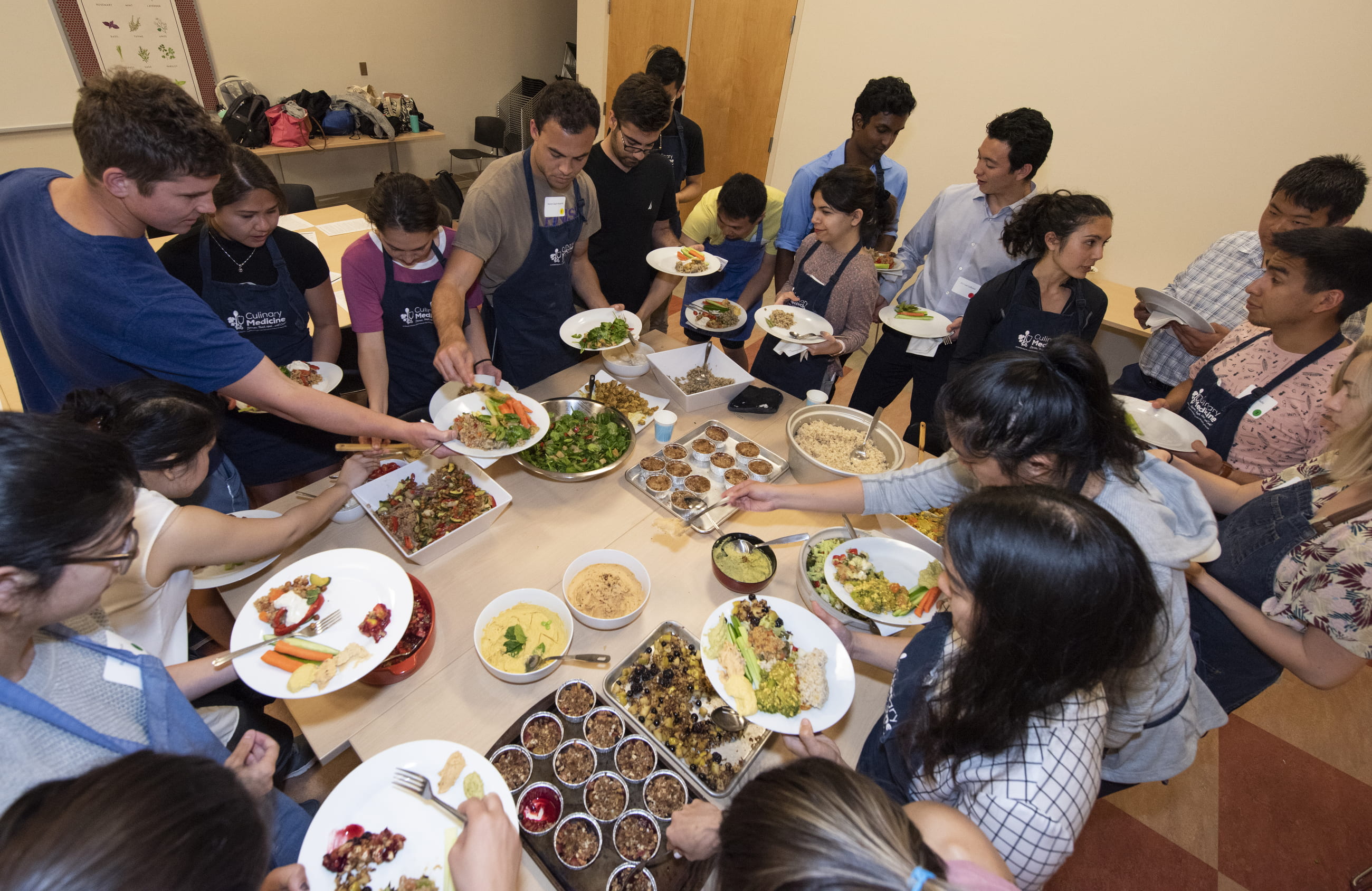Prescription: nutrition
Culinary medicine class teaches future physicians how to practice what they preach – and pass it on to patients

In UCI’s culinary medicine course, first- and second-year medical students learn that food is medicine. Consisting of five three-hour workshops in the Anteater Recreation Center’s teaching kitchen, the class aims to equip future physicians with practical skills to help their patients follow doctors’ orders to “eat healthy.”
An elective, the course is led by Dr. David Kilgore, a clinical professor of family medicine and director of UCI’s integrative medicine program, and Jessica VanRoo, chef and culinary education coordinator at the ARC. Together, they share nutritional knowledge and basic cooking techniques.
Each class tackles a different medical issue. For instance, students recently learned about hypertension, or high blood pressure, which affects 1 in 3 U.S. adults. The root cause is often excessive sodium intake, which makes it harder for the body to regulate blood pressure. Hypertension can lead to heart disease and be fatal if not treated.
After going over current research on dietary approaches to stop hypertension – which focus on fruits, vegetables and low-fat dairy items – the students moved to their cooking stations to prepare compliant cuisine.
Evidence shows that the DASH diet lowers blood pressure in the same way as do hypertension medications. It’s similar to the highly rated Mediterranean diet but tailored to suit the American palate. Being cognizant of the diverse range of patient backgrounds is an important feature of the class.
“People are not going to change just because you’re telling them they need to. You have to incorporate how they grew up,” said VanRoo as she introduced ingredients and offered tips.
The dishes included a wide variety of flavor profiles: soba noodle salad, vegetarian chili, miso soup with tofu and mushrooms, sweet potato gnocchi, roasted chicken and vegetable soup, and broccoli pasta. For dessert, the students baked black bean brownies and apple crumble bites.
They were encouraged, while they cooked, to reflect on the various ways to reduce salt in their everyday meals. For example, they could incorporate more spices and herbs, as well as a savory flavor called umami. And nutritional yeast, which also provides a substantial dose of vitamin B12, could be substituted for parmesan cheese.
“Research shows that nutrition is an easy way to help our patients without drugs. I’m not saying drugs are bad, but it’s preferable to not have to use them,” said Jason Xu, 23, who aspires to work in sports medicine at a university.
Many of the students were preparing a meal for the first time. VanRoo taught them how to break open a chicken, chop onions without tearing and roast vegetables. The recipes were simple enough to fit into the college lifestyle.
Kathryn Rosenbaum, 24, said, “Everyone wants to take this class. I think it should be mandatory. We learn a lot of stuff we should all be learning.”
Visiting the class was certified dietician Amy Zhong. Her advice was straightforward: “More whole foods. Less processed foods.”
Once completed, the repast was served buffet-style. While enjoying their peers’ creations, students got a lesson in mindful eating from Zhong.
“Who picked that food? Think about where it came from,” she said.
Finally, Kilgore presented a hypothetical case study: a young man with a stressful lifestyle who ate mainly high-sodium and processed fare. Students discussed the changes he could make to improve his overall health, among them consuming more garlic, upping his intake of omega-3 fatty acids and drinking hibiscus tea.
The course is part of UCI’s integrative medicine program – offered through the Department of Family Medicine and the Susan Samueli Integrative Health Institute – which promotes a multidisciplinary, patient-centered approach emphasizing wellness, prevention and self-care skills. Nutrition is a cornerstone of the program, focusing on healthy, cost-conscious and simple meals.
But above all, Kilgore says, “they have to be delicious.”




